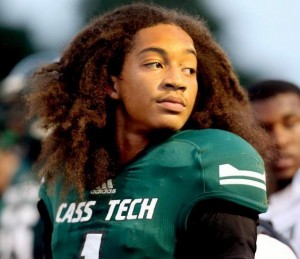Photo: Diane Weiss/Detroit Free Press
Flying across the field, hair streaming from under his helmet, Jayru Campbell found his freedom in football. Now, this talented 17 year old from Detroit, is facing the loss of that freedom and possibly his future.
A highly recruited quarterback, pursued by many of the top Division I schools, Jayru had the world on a string. Passing up offers from Alabama and Notre Dame, he ultimately chose to continue his football career at Michigan State.
But now, all that may change because Jayru was charged with felony assault after he body-slammed a school security guard to the floor because of a perceived slight.
The short version of the story is that Jayru, a junior at Cass Tech, was asked by a security officer to put down the hood on his sweatshirt. He refused and was approached about it again. At some point, Jayru grabbed the guard, and in one powerful motion, drove him into the floor. The guard received injuries in the attack. It was all captured on security cameras.
I’ve seen the video. The brutality of the attack is shocking.
This case speaks to the rising phenomenon of physical violence in the lives of young people today. All too often, a physical confrontation such as this one can escalate to the use of firearms. And it happens everywhere in America, not just in Detroit. Here in Chicago, young men kill each other with stunning regularity, their bloody encounters frequently spilling over to innocent bystanders.
Some of the problem is clearly drug related, but a larger proportion of this kind of violence is due to a warped, machismo that demands respect. Violations of that respect, or disrespect, require immediate, decisive retaliation.
Detroit Free Press editor Stephen Henderson takes up the Jayru Campbell case in his recent editorial. In it, he addresses this phenomenon:
There are important lessons here for him, but also much wider cultural and societal implications.
One of the most prominent issues in my mind is the question of “respect,” and violent overreactions to real or perceived “disrespect,” a dynamic that inspires confrontations and even homicides every day, especially in cities like Detroit.
As a father, and especially as the father of a black boy growing up here, I worry endlessly about that.
Henderson goes on to discuss the grim future for young men like Jayru once his debt to society is paid:
The danger is that Campbell could become just another black kid who screws up, gets locked up, then loses all the opportunity that awaited him before his misstep.
In Detroit? There are thousands of those stories, and the region pays as heavy a price for that as the young men trapped in a system that’s too stingy with second chances.
Consequences are one thing, but brutal, unforgiving consequences are far too typical in our criminal justice system, and that injustice visits far more frequently on black males than others.
I would add that while black males are predominantly represented in this population, it also includes Hispanics, Asians, and Caucasians.
What then, are we to do?
We cannot abandon the rule of law, but neither can we become a nation of vigilantes. That only leads to tragedies like Trayvon Martin/George Zimmerman. Equally tragic is the way we often slam our doors in the face of those who have made mistakes.
Stephen Henderson again:
The system is set up to all but ensure failure. We ask people who have broken the rules to do better after they’ve been punished, but we lock them out of so many opportunities to return to normal society. They can’t get jobs. They’re often not allowed to vote.
Kafka couldn’t design it any better: Make it back from your lowest point, but do it while all the rungs on the ladder in front of you are broken.
I agree. Without second—or sometimes even third and fourth—chances, where would any of us be? I hope there are people in Jayru’s life who will help him get past this no matter what happens from here on out.
However, I think the heart of this problem is, and always will be, the heart.
If our young people do not see the inherent value in the the person standing opposite them, no matter their color, religion, or group affiliation, but continue to see themselves as the center of the universe, this will continue. Ultimately, in order to gain respect, one must first show respect.
Where do our kids learn these attitudes? From the adults in their lives. If we want a solution to the problem, we had better look in the mirror first.


“If our young people do not see the inherent value in the the person standing opposite them, no matter their color, religion, or group affiliation, but continue to see themselves as the center of the universe, this will continue. Ultimately, in order to gain respect, one must first show respect.
Where do our kids learn these attitudes? From the adults in their lives. If we want a solution to the problem, we had better look in the mirror first.”
Amen, Rob!
All the more reason that the Scriptural admonition to parents in Deuteronomy 6 still holds:
” 4 Hear, O Israel: The Lord our God, the Lord is one.[a] 5 Love the Lord your God with all your heart and with all your soul and with all your strength. 6 These commandments that I give you today are to be on your hearts. 7 Impress them on your children. Talk about them when you sit at home and when you walk along the road, when you lie down and when you get up. 8 Tie them as symbols on your hands and bind them on your foreheads. 9 Write them on the doorframes of your houses and on your gates.”